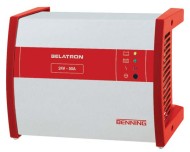 As the leader in innovative charging solutions, Benning were the first company to introduce the now well known High Frequency technology into the MHE market, using the existing technology from its telecoms business.
As the leader in innovative charging solutions, Benning were the first company to introduce the now well known High Frequency technology into the MHE market, using the existing technology from its telecoms business.
High Frequency battery chargers today account for approx 70% of the market, and this is increasing year on year, driven by the needs of end users for high efficiency and lower carbon footprint.
However, High Frequency technology is also well known for its poor reliability, and industry figures show that up to 33% of HF chargers fail within 3 years. Why is there such a high failure rate?
HF chargers require forced air through fans in order to keep the charger cool, and this air is blown over the delicate electrical components. Just like televisions of the past (if you have ever opened the back of a television), the main board attracts all the air borne dust. This dust, even in the cleanest environments will contain conductive dust or corrosive acidic particles from the battery, and so the effect is PCB failure. 95% of the HF failures are due to the breakdown of the PCB through conductive or corrosive dust. With a UK HF market of approx 9000 units per year and up to 33% failure rates within the warranty period, we can clearly see a need for an improvement in charger technology.
Of course, the effect of this is clear. Truck down time and un-happy customers. It will generally then be a service call to the truck supplier, generating the cost of an engineers time and then additional service visits and cost by the charger manufacturer before a resolution. Quite a costly and time consuming process.
Given the lease contract term warranty of generally 5 years for the UK, it is critical that downtime through manufacturing fault is minimised. A 3 year product with a 5 year warranty is not an ideal match!!
After 2 years in development, Benning very successfully launched its new HF charger at IMHX in November last year. With new technology, Benning are producing a product with a 10 year design life, with the result being significant reduction in truck down time and cost, and of course happy customers. The critical point is that Benning have eliminated the PCB failure due to conductive air and so increased the reliability of HF technology.
Coupled with its unique reliability in HF technology, the Belatron charger is also the most efficient product available with up to 95% efficiency along with carbon footprint and maintenance reductions. The battery temperature is kept low with the use of pulse characteristic during the gassing phase, and so we are able to also reduce charging times significantly. All these benefits are essential to ensure whole life costs are minimised.
Both air circulation and automatic topping are standard options with the new Belatron as is the new “service call” facility. The charger has the capability to send email or text to a service contact when an error code is present. The service contact will remotely decipher the information and make the appropriate service call if required, with the result being an increase in first fix rates.
![]() All in all, Benning have produced quite a unique product, eliminating PCB failures and truck down time, reducing service costs and increasing HF quality and reliability. As the market for HF grows, this product is a significant leap forward in charger technology.
All in all, Benning have produced quite a unique product, eliminating PCB failures and truck down time, reducing service costs and increasing HF quality and reliability. As the market for HF grows, this product is a significant leap forward in charger technology.
“With the significant decrease in charger failure and truck down time, we see a real opportunity for End Users and MHE companies to reduce risk, service costs and carbon emissions, whilst critically increasing efficiency without the need for additional cost. The new product objective is to achieve the same reliability as the standard 50hz whilst ensuring commercial acceptability, with the bonus of ensuring MHE fleets have a viable charging source for the aftermarket at the end of contract.” said Jason Mander, Sales Director Benning UK.
Benning UK
Tel: 07825 873020




Comments are closed.